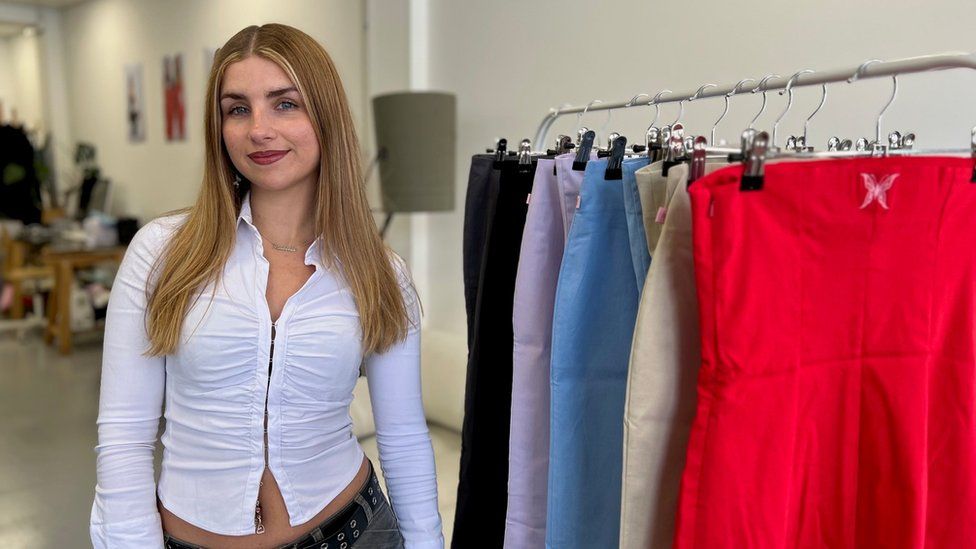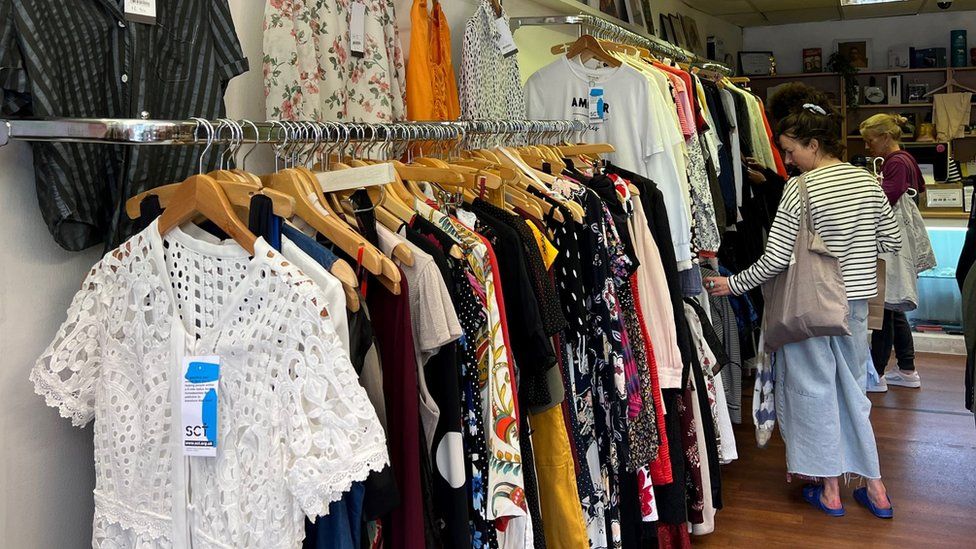
Isabella Vrana has turned selling second-hand clothes online into a business
Second-hand clothing has come a long way from a rummage-fest in the musty charity shop of old.
Buying and selling “pre-loved” clobber is now a huge industry, in part due to online companies – or marketplaces – such as Depop, Vinted and eBay where people can trade clothes.
But there is evidence that some fashionistas are choosing to buy second-hand clothing only, not just for value and environmental reasons, but because they want individual style.
Isabella Vrana, 26, has made a business out of it.
From a hobby that she started on Depop as a student eight years ago, she has generated sales of £800,000 and the business is still growing.
It all started because of a “shopping problem”.
“I was buying too much for myself basically,” she says. “But I was getting it all at really good prices because everything was second hand, so I just decided to start selling those pieces for money and realised that I was making profit off each piece.”
While her fellow university students were working in pubs or restaurants at the weekend, Ms Vrana – sometimes with the help of her mum – was packaging up vintage clothes for customers and dashing to the post office between lectures.
After failing to get a job as a professional fashion buyer because of a lack of industry experience, Ms Vrana decided to take the plunge and move into selling second-hand clothing full-time.
It was scary, she admits. “At the time I was thinking, ‘I just want a boss and a pay cheque and holiday and sick pay.'”
But she says: “Actually I’m really glad I just sort of went for it because I love being self-employed.”
Ms Vrana now employs three people and has a shipping container/warehouse as well as two studios where clothes are shipped, sorted, photographed and sent out to customers who access her business through Depop.
She also recently set up a wholesale business to sell vintage clothes to other online firms as well as hosting pop-up shops in New York, Dublin and Copenhagen. And she sells her own Isabella Vrana label.
Over her eight years in the business, Ms Vrana says she has seen huge changes in demand for second-hand clothes.
“It wasn’t such a normal thing when I started so I’ve definitely seen an increase in people buying second hand to try and be more sustainable,” she says.
Plus there’s the quality of well-made vintage clothes. “These items are lasting decades and they’re being worn as well. Take a vintage pair of jeans – I’ve got jeans with dry cleaning labels from the 1990s and they’re still going so strong,” she says.
“I think people are realising that you might be investing a bit more of an upfront cost, but then it is really paying off long-term.”

Charity shops are seeing demand for clothing increase
Adam Jay, marketplace chief executive at the clothing resell app Vinted, says the growth in demand for second-hand clothing as been “phenomenal”.
Vinted now has over eight million registered members in the UK, up from 1.2 million in 2021.
There are the obvious reasons why people are attracted to second-hand clothing.
Buying new clothes and footwear can be expensive at a time when many people are struggling with the cost of living.
The rate at which prices are rising for clothing and shoes hit 6.5% in the year to April, according to the Office for National Statistics.
Meanwhile, the fashion industry is responsible for generating between 8-10% of global emissions, according to the United Nations, from growing cotton to using oil to create synthetic materials such as polyester.
But for fashion and sustainability vlogger Rosie Okotcha “thrifted fashion is very cool now because its my personal style, no-one else can get it”.

Fashion vlogger Rosie Okotcha wants to end the stigma around buying second-hand clothes
She credits TikTok and Instagram with driving the trend for second-hand clothing, in particular with “Gen Z” shoppers – that’s people who were born in between the mid-1990s and mid-2000s.
That is reflected in the sort of styles people are buying.
According to Depop, “Y2K” is a popular trend on its app including oversized denim, colourful crochet and vintage t-shirts. There’s also demand for one-of-a-kind and customised items, as well as clothing that is handmade or reworked from existing pieces.
But while the internet might be fuelling the trend, there is vintage fashion to be found in the High Street charity shop.
Ms Okotcha says that part of her mission is to try to “break down the stigma that there is something wrong with shopping second hand because it is actually really fantastic fun and great for the planet”.
While it might seem inevitable that the popularity of apps might have ended up re-routing clothing donations away from the High Street, the Charity Retail Association (CRA) says that’s not the case.
Charity shop sales rose by 15.1% between January and March compared with the same three months last year.
“There is plenty of second-hand clothing to go around, so we see the growth of online selling platforms as complementary to the work of charity shops,” says the CRA.
Ms Vrana agrees that there is plenty of room for competition, and she plans to continue.
“There’s definitely money to be made,” she says.
“You can definitely support yourself through doing this full-time, which I’m really grateful for because sometimes it doesn’t even feel like a job because I enjoy it so much.”

Tips for selling online
- Use social media: Sharing pictures of what you want to sell on apps such as Instagram means extra views and hopefully buyers. Include details of where people can find you on marketplace apps in your bio.
- Compare:If you can’t decide how much to sell a piece of clothing for, check out what other people are charging for similar items.
- Good lighting: Make sure you show the clothing you want to sell in clear lighting. Don’t be afraid to point out flaws in the garment – people want to know what they’re buying.
Original Article: https://www.bbc.com/news/business-65854595








